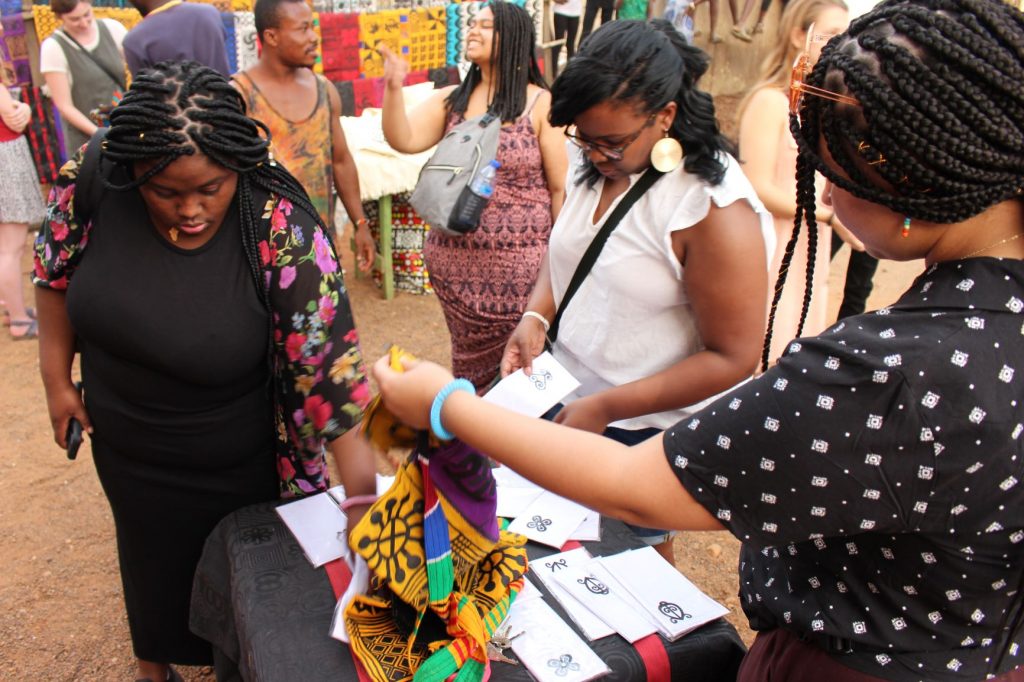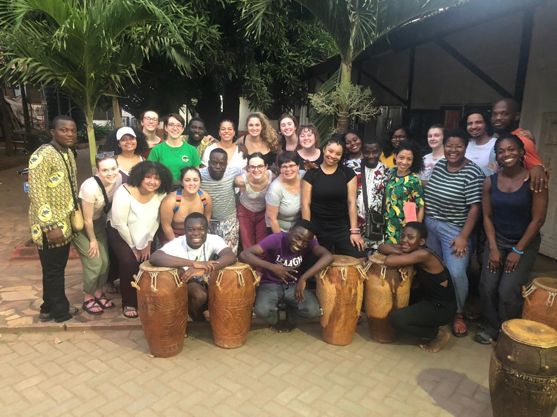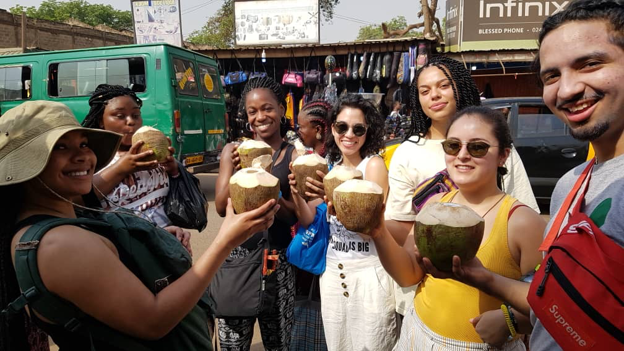I Saw Myself in New Spaces: You Can Too
An argument for study abroad reform at
the University of Puget Sound
By: Makenna Hess-Fletcher
This opinion piece is personal to my experience. I will not remove myself from it, but as I have learned in my Public Scholarship course (AFAM399) the personal is political. So, I will tell my story as an argument for the creation of more space to have stories like mine.
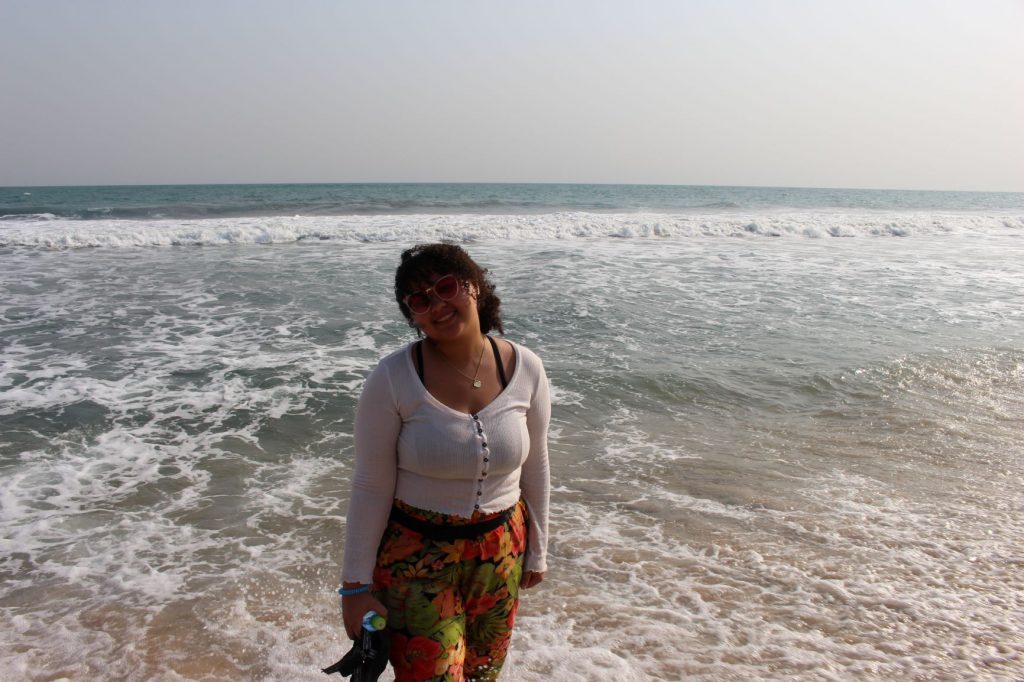
It started as a daydream. Everything about the actualization of my participation in this study abroad trip to Ghana was unexpected. It was just Spring 2018, and I was taking my first course in African American Studies, AFAM 101. I was just beginning to find what I did not know would become my home, my major, the focus of this stage of my education. Dr. LaToya Brackett, who organized and led this unique study abroad trip told our AFAM 101 class about the information meeting for Ghana. I had never considered going abroad, I did not think that would be something for me during my time in college. Because I loved being in AFAM 101 and knew Dr. Brackett, a Black woman professor, would be a part of this trip, I decided to attend the information meeting just to see what it was about. Just to dream about the possibility. I could not have anticipated that this daydreaming would become a reality.
I did not want to be the only, or one of two, Black students on this trip. I know what this feels like from everyday experiences in the classroom. It is isolating and I would not want to experience this in another country as well.
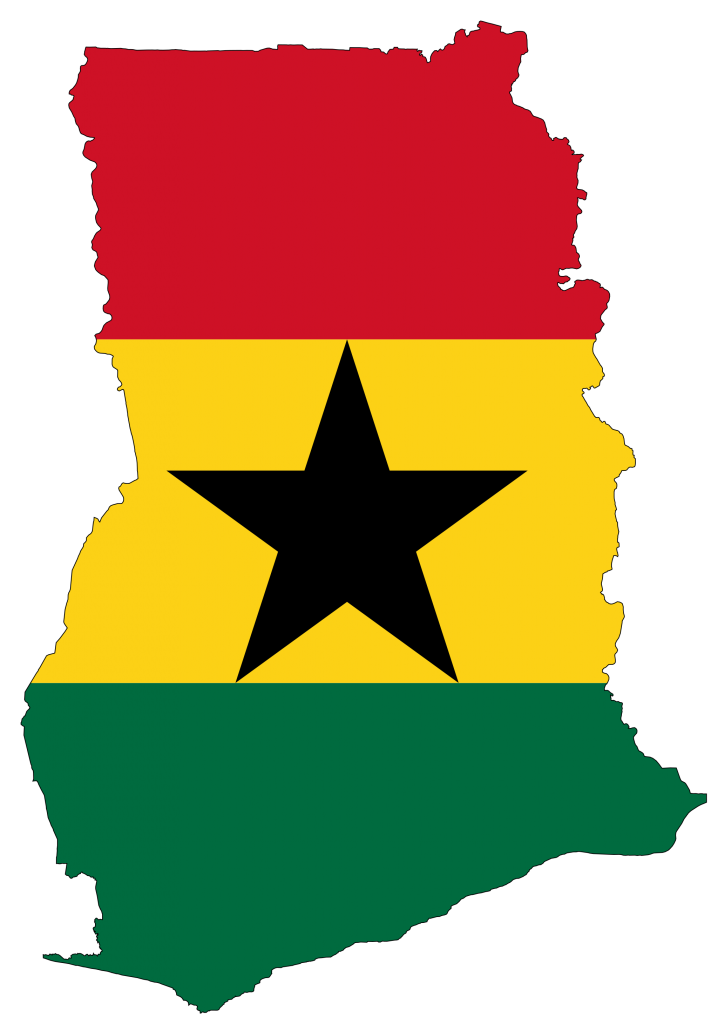
Moving from a Dream to a Possibility to a Reality
After the information meeting, I had to assess my obstacles. What was standing between me and Ghana? Well, for other study abroad opportunities, I would have had to quit my job that I need to have. Traditional study abroad requires going to another country for an entire semester. Since Ghana study abroad trip was 3 weeks long, I would be able to keep working and take time off for the trip. Okay, there is one thing that works for me. What else? I did not want to be the only, or one of two, Black students on this trip. I know what this feels like from everyday experiences in the classroom. It is isolating and I would not want to experience this in another country as well. I did not know for sure what this would look like until I was already committed. Based on the information meeting, I knew other Black students were also trying to navigate the possibility of going to Ghana. I was not the only Black student who felt welcome in this study abroad space. So, seeing students who looked like me gave me a sense of comfortability in pursuing this opportunity further. So, what was the biggest obstacle for me? I did not have the resources to just be able to go to Ghana. Because it was not a semester long study abroad venture, there would be fees that would not be covered by tuition. This is a huge obstacle, but because of the leadership and location of this study abroad trip, I could not let this unique opportunity slip away. I needed funds for a course fee, plane ticket, items like bug spray, and money for meals and spending in Ghana. I did not start out with this money or the knowledge about how I could get this much money in one summer. I did however have a professor who cared, a professor who wanted to see me make it on the trip. In order to go to Ghana, I needed to fundraise. Dr. Brackett helped encourage me to start a Go Fund Me, and to really believe that I would be able to go to Ghana. This guidance helped me to believe that this trip was a space for me too. The fact that a Black woman was organizing and leading this trip made me feel that this space was open, inviting, and inclusive of me, a young Black woman finding my place in this world. Other study abroad programs never stood out because they were led by white faculty who seemed to have less of an investment in seeing students like me being able to be a part of their trip. In this case it was so different because I had a professor who cared enough to help this become a reality.
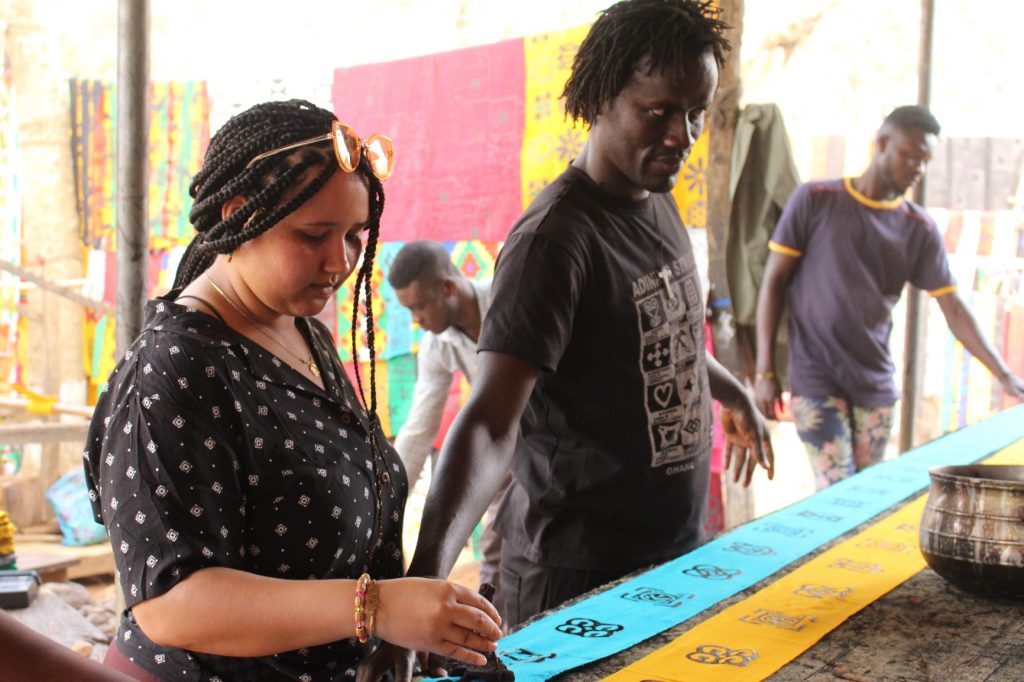
Nervously Taking Off, but Calmly Landing
Heading to the airport I was so nervous. So unsure. All of a sudden, I wanted to back out. Wondering, what am I doing? Is this really for me? I was anxious during every flight. On the flight from London to Accra, I was awake for the entirety of the flight. I was sitting there for six and a half hours thinking about everything that led up to that moment. Thinking about those moments in Dr. Brackett’s office where we were strategizing and discussing the possibility of me going to Ghana. I was feeling the nerves, excitement, and uncertainty all at once. I could not believe I was on this flight. I was so uncertain because I had no idea what taking this chance would teach me. We were getting closer to Ghana. Seated closest to the window, I watched the city lights of Accra light up the pitch-black night sky as we flew closer and closer to our landing. Soon we’d have our first breath of Ghanaian air. Stepping off of the plane, I was forced to embrace my surroundings and embrace the newness, the unfamiliarity that was Ghana. The air was crisp, and still. Hot, but not suffocating. My lungs collapsed and expanded with ease. Why did I feel so comfortable? Suddenly I felt calm. I felt at peace. I had never felt so sure of anything.
Suddenly I felt calm. I felt at peace. I had never felt so sure of anything.
After being greeted by Ghana with open arms, we made our way to where we would get our first Ghanaian meal. Dr. Brackett, who knows each of us, and is familiar with navigating the Black space that is Ghana coordinated the pickup of our 22 meals at around 11pm. This is the first of many times to come that Dr. Brackett would navigate Ghana and conversations with Ghanaians to ensure our large group was taken care of. She showcased leadership and the familiarity she needed to have with us as individual students and familiarity with Ghana. From the beginning of the process to the end, her leadership made the possibility of this trip, the departure for this trip, and our time in Ghana a space for Black students to exist and to see themselves in these new spaces.
From the beginning of the process to the end, her leadership made the possibility of this trip, the departure for this trip, and our time in Ghana a space for Black students to exist and to see themselves in these new spaces.
Impact on the Self
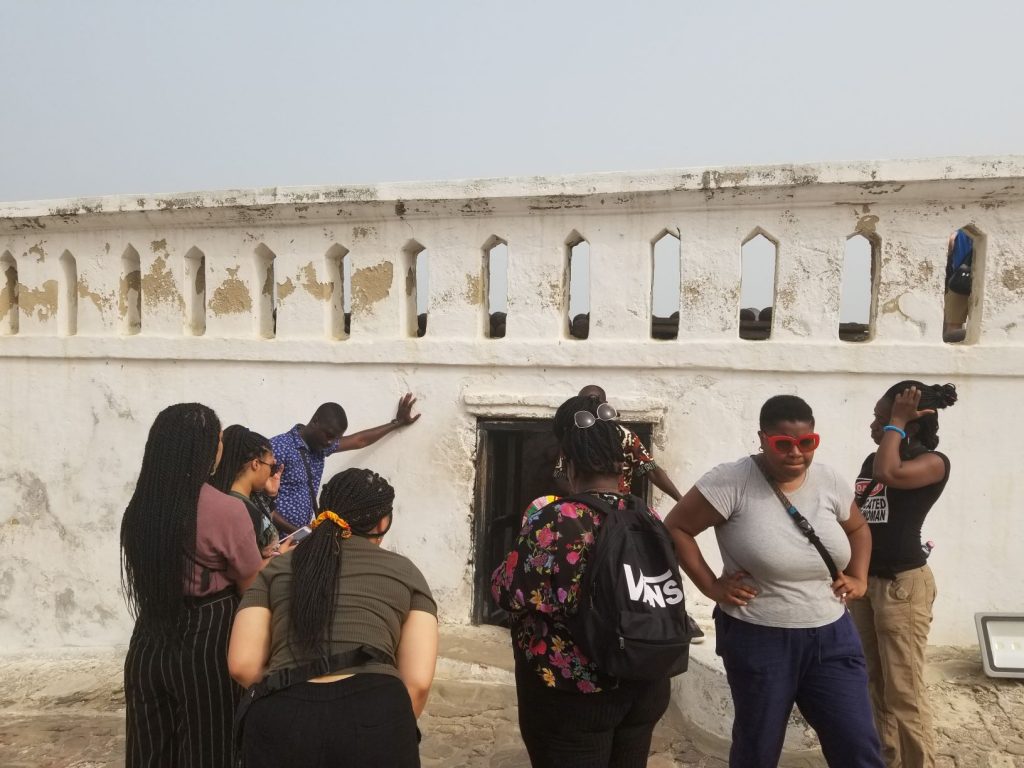
Black artists. Black scholars. Black neighbors. Black daughters. Black is the standard. Black is beautiful. Black people are the creators, the writers, the chefs, the innovators. I saw this in Ghana, and I know this with certainty. I know this with the kind of certainty I have never once felt before. I struggled to see myself as someone who could be important, who could create knowledge and inspire change in myself or those around me. In Ghana, I began to feel at home in my own body. In so many ways, Ghana felt like home. There was a warmth in every smile and a sincere invite in every “akwaaba.” In Ghana I felt freer than ever before. I felt like there was a relief from the same worries about how I am perceived that I have when I simply walk into a retail store in the U.S. I was able to exist at times without feeling like I would be labeled with racially charged stereotypes. This gave me the power and the freedom to see myself for who I am, and to think less about how I am perceived- something I have always struggled with. I felt especially comfortable navigating a Black space in times where we moved about in our affinity groups. This made us stand out less. I enjoyed being what I felt was “well-received.” Being in a Black space gave me confidence. A confidence that I will always carry with me, and that serves as a reminder when I feel like I am forgetting what I am capable of.
Being in a Black space gave me confidence. A confidence that I will always carry with me, and that serves as a reminder when I feel like I am forgetting what I am capable of.
This study abroad trip started out as a dream, then became a possibility, then it turned into a reality. Having leadership that was a Black woman professor who knew and cared about each of the students who would attend the trip was vital to this trip. Having someone want me to be able to be on the trip, and to be willing to help me figure out how to navigate making it happen was so important and unique. Being in a location that was a Black space was a rare necessity. It allowed all students on the trip to reflect on the self, to see the self and to understand each of our relationships to the world better. Having a short-term study abroad option made this trip accessible for myself who works a job, and for other students who were athletes to be able to go to Ghana. This was a unique study abroad opportunity. But what if it was not? What if it was normal for students like me to feel that study abroad was a space for them? What if study abroad lengths varied, and were always included in tuition? What if the few professors of color on campus were encouraged, and given the resources to plan and execute study abroad trips often? If the University of Puget Sound genuinely wants to have more inclusive, diverse study abroad programs they must see past the typical bounds of what study abroad has been. They must reimagine the possibilities and listen to what students of color want and need. Most of all, they must back this up with structural and financial support because every Black student, every student of color, deserves to do more than dream about a study abroad trip made for them.
This was a unique study abroad opportunity. But what if it was not? What if it was normal for students like me to feel that study abroad was a space for them? What if study abroad lengths varied, and were always included in tuition? What if the few professors of color on campus were encouraged, and given the resources to plan and execute study abroad trips often?
